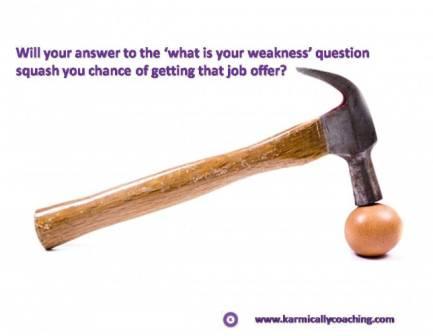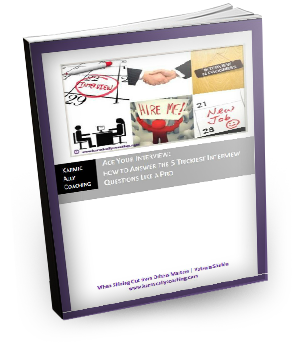This post has already been read 4433 times!

Ever wondered how to answer the ‘what is your greatest weakness’ and variants like ‘what are your 2 weakest areas’, ‘what are your greatest strengths and weaknesses’?
Or even the question that if the interviewer were to call your former employer, what would they say about you?
These are all ways that the interviewer tries to find out more about the real you. The part that is hidden behind the interview persona and what it would be like to work with you.
Often called the trick question part because it can stump even the best interviewee, it is easy to win with a strong answer.
In this post, I am going to share 2 options on how to tackle this challenge without falling flat on your face.
Don’t let the stress of the weakness interview question get you down
Being interviewed for a job, especially if you have been out of work for some time can be stressful in itself. You may have your guard up so high that your responses may be knee jerk ones despite the best pre-interview preparation.
The first thing to remember is that this is an age-old question.
If you give a trite or hackneyed run of the mill answer, like turning a negative into a positive, you might send out the wrong signals that something is really wrong with you or there is a cover up in progress.
In any case, if the question is a well beaten one, then the interviewer would also know the standard answers. He can trip you up with a follow up question or ask you to elaborate with examples.
During my corporate world days, the answers were easier by simply turning a positive which when taken to the extreme could be a negative. Since many of us did not have coaches to tutor us for the interviews, the answers were sincere and unpracticed.
It also helped to tell the interviewer that I was aware of the weakness and was working on it with a few examples.
That usually helped to move the interview to the next question after being told with great empathy that there was nothing wrong with the weakness.
If the interviewer was nice, the weakness was rephrased, and I would make a mental note to include it in my next CV update. It would also lead to learning more about the company’s training and professional development initiatives.
To be honest, the interviewer really does not want to know a lot about your weakness.
He or she is just checking to see how well prepared you are for the interview and to try to gain a better understanding of you and how you would fit in the organization.
A lot of information is gleaned during the interview with the ‘Tell me about yourself’’ and ‘Why do you want to work for us’ questions. This is just a continuation of the discovery and assess protocol.
Even today, there are certain ground rules to answering this question.
Be authentic, be brief and be general with your reply. Make sure you answer the question. Whatever else you do or don’t do, please do not say that you have no weaknesses. You risk coming off as cheeky and arrogant.
Besides, we all have weaknesses and shortcomings.
Remember, that you were invited for the interview. The recruiter must have seen something in your Resume and profile to issue the invite. Time is a precious commodity, and they are looking to hire a compatible competent professional, not torture you because they have nothing better to do.
How to choose your weakness and convey it from a place of strength
First things first, do not choose a weakness because you read about it somewhere and liked how it sounded.
This is where the authentic part comes in. Just because it sounds good, does not mean that it will work out during the interview process. Especially if the interviewer asks you to elaborate, asks what self-improvement initiatives you have taken or suddenly flips the switch by asking for a real weakness.
The cardinal rule to follow is to first choose the weakness and then demonstrate what you are already doing to dilute it and improve yourself.
Make sure that your answer is genuine. Some firms actually do background checks and also vet candidates via their social media profiles. If you say you have undertaken some training to overcome a weakness, back it up with evidence.
Here are 2 options for choosing your weakness or maybe 2 weaknesses as part of your back up plan and how to discuss them.
Option 1 – choose a weakness that is evident from your resume
Assuming that you have done your homework about the company and studied the job description beforehand, you would already know if there is an area which can be a competency gap and where you might need to put in some extra work and demonstrate that you are either working on it or are willing to work on it. Your interviewer would also have noticed it.
By bringing this up as your answer, you get a chance to highlight to the interviewer the seriousness of your intent for the job and your awareness of a deficiency that has to be overcome.
For example, supposing the job description talks about teams and knowing how to work in a team. Now, if in your previous job your work did not involve team members although you did interact with the rest of the department on an as required basis, you could state your weakness as not having that experience.
“Your role requires that I be able to work as a team member. In my previous jobs, I did not have to work as part of a team and used to mostly work alone reporting directly to my boss. However, I did participate in department meetings and liaise with other colleagues as part of my work. I am sure I can transfer that skill to a more concentrated team as I am used to working with others. This is an area that I know I have to improve on.”
No one will kill you for lack of experience if you show that you are aware of the weakness and are willing to overcome it.
Option 2 – choose a weakness that is not relevant to the position or of minor consequence
Mention weaknesses that won’t affect your ability to work effectively in the position.
For example, there are many people who are alright talking to people face to face or with small groups but feel uncomfortable talking to people on the phone or are afraid of public speaking. They are quasi-confident.
In this case, you could say, “I know I need to work on my discomfort of talking to people on the phone even though I love interacting with people in person and in groups and have no problem with skype or video conferencing. Not being able to see the person and their reactions tends to make me nervous. So after researching this area, I have taken classes to develop active listening skills and breathing skills to overcome my fear.”
By acknowledging the weakness and indicating that this is an area that you are working on. You show that you are proactive and know your skill development needs and are working on it.
You can continue the dialogue by asking if the company provides in-house training on soft skills that could help you with your professional development if required.
My recommendation for this question
When preparing for this interview question, look at the job description carefully before choosing your weakness. If you are applying for a job that requires diplomacy or confidentiality, revealing your weakness for voyeurism, snooping on others or bashing people on social media is not a good weakness even if you declare that you are undergoing therapy for this.
Your mission is to move gracefully to the next question and not ruin your chances of getting the job offer.
What experiences have you had with the weakness question during a job interview?
Did you win with a strong answer or was it back to pavilion? Do share your story in the comments box and please do share this post with others. Who knows who needs to read it right now?
Additional Resource for Job Interview Tips for only $5

Learn more here: Ace Your Interview Guide
Written by: Vatsala Shukla



 I adhere to the Certified Coaches Alliance Code of Ethics and Standards. A copy is available on request.
I adhere to the Certified Coaches Alliance Code of Ethics and Standards. A copy is available on request.
 Let's Talk through the Connect Form:
Let's Talk through the Connect Form:
Great idea of a post, Vatsala! Oh, how horrible that “weakness” question is when you feel that your entire future, possibly your family’s too, depends on that answer.
But as you said and as hard as it seems to be, you have to embrace it with an open heart and answer with a joke, if you can. This usually dissipates the stress and, if your interviewer is not rigid, can actually turn out into a nice conversation afterwards.
This is a question that can stump the best of us and given that the interviewer also knows the same techniques and answers that interviewees are being coached to give, it makes more sense to be human and show an authentic weakness which you were aware of and have overcome. It helps the candidate to come across as being proactive. Given that the corporate world is a hectic fast paced one, this is an added bonus for the prospective employer. Thanks for sharing your observations, Delia.
It’s interesting for us all to take a moment and see what we consider our weaknesses and then to be prepared to not only say them, but to have ways we are working on them. The first one that came to my mind was “I am always wanting to get to the result as quickly as possible and often the “process” is most challenging for me”. That would be an interesting one to formulate a reply to. Working on team projects now I always play to my strengths which I see has great value in working situations. Great food for thought in this post Vatsala and also great tips to consider as well.
Thank you Beverley for sharing your experience. At some point of time, we are all guilty of the weakness of wanting to get the results and often find the process to be tedious. Yet, when one is aware of this aspect, it is easier to play to one’s strengths in a team situation and let a more process-driven colleague steer us towards successful project completion.
Nice article. Very helpful hints for answering that nasty interview question. I’m partial to saying that my weakness is chocolate. 🙂
Thank you Shawn, glad you appreciated the tips on the interview question. I’m not quite sure how well stating one’s partiality for chocolate would work for this interview question. It might give the impression that you are being cheeky since the focus of the interviewer is to discover more about you as a person. Having said that, I love chocolates too!